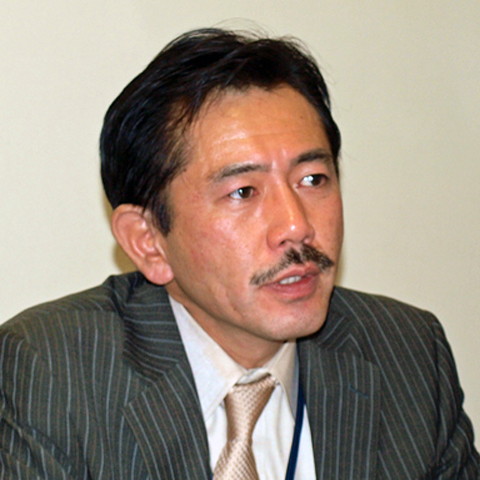Kenichiro (Ken) Ogawa, Executive Vice President and COO of NTT DATA Global Solutions (GSL) as well as Executive Advisor for OYSTEC, talks to Gernot Kapteina, Founder of OYSTEC, about how NTT DATA helps its Japanese customers becoming global with the help of SAP solutions.
Ken-san, thank you very much for doing this interview! First things first: Could you tell our readers a little bit about your career and how you became COO and Executive Vice President in NTT DATA Global Solutions?
Ogawa: Thank you very much. Sure. I have a master's degree in Precision Engineering from Kyoto University and joined NTT DATA Corp. in 1989. There, I was initially involved for more than five years in a business-critical systems development project for a large advertising agency. In October 1996, I was appointed Deputy Manager of the Hong Kong office of NTT DATA. Until September 1998, I proposed various IT systems to the Hong Kong branch of Japanese multinational companies and the Hong Kong government, while also managing the ISP (Internet Service Provider) business. Upon my return to Japan, I was assigned to the ERP business unit and became an SAP certified consultant to SD, which was in the well-known SAP R/3 times. In 1998, I entered the ERP system development department as a Senior Manager. Later in 2005, I was appointed Project Manager of an SAP implementation project with a budget of over several billion yen and several hundred project members. Since 2007, I have been promoted to Executive Manager and worked in various departments, including the consulting department, sales department, and business development section of NTT DATA's manufacturing division. One of the main objectives was to promote the SAP business in Japan. Since then, I have taken on more and more responsibility. In 2011, I was responsible for setting up a global SAP team in NTT DATA - the SAP Global One Team - as we had acquired global companies that also had SAP expertise. That's also how we both got to know each other. Later in October 2012, we founded NTT DATA Global Solutions to implement SAP in Japanese companies together with all NTT DATA SAP forces. I have remained loyal to the company to this day and serve the team in my role as COO and EVP.
Based on your resume, we can say that you are a traditional Japanese Salaryman and Executive who work hard and dedicate your life to the company. Also, your commitment to NTT DATA Global Solutions demonstrates this. Now, can you tell our readers: What kind of company is NTT DATA GSL; what makes it special?
Ogawa: As you know, NTT DATA Global Solutions (GSL) is a wholly owned subsidiary of NTT DATA Corp. and is managed by Motonobu Isoya as CEO and me as COO. We bundle most of our SAP forces in NTT DATA Japan to focus on the pure SAP business for our customers. Since the foundation of the company we have grown steadily to currently almost 500 colleagues. By the way, we no longer have only Japanese colleagues, but also many global fellows among us. This also makes our company special. Our mission is to help Japanese companies in Japan as well as their subsidiaries outside Japan to implement SAP solutions according to a holistic standard. On average, our colleagues are younger and extremely motivated, and are very familiar with the SAP world.
How does NTT DATA GSL attract new employees to join?
Ogawa: Firstly, we make sure that our employees feel comfortable! For example, we have moved into a new office with very modern equipment, which is also centrally located in Tokyo. Secondly, we make sure that our employees are given the opportunity for continuous training to keep up to date: the SAP business is very interesting, and it offers younger people in particular the opportunity to work with the best business software available. Thirdly, we offer the opportunity to work not only with Japanese customers, but also globally with other nationalities. The world is becoming increasingly open, and young people in particular are interested to explore it.
Which SAP product range does NTT DATA GSL cover?
Ogawa: We are an important partner of SAP and offer essential SAP solutions. Our offering structure is built around consulting and maintenance. In addition, we offer hosting services in cooperation with NTT DATA partners. I want to say: In today's world, it is important not to talk to a (potential) customer immediately about SAP technology, but first and foremost to talk to them about digital transformation and the extent to which SAP can play a role in this. This is how we automatically get to our SAP solutions. Even though we offer SAP products such as Business ByDesign, or even services on the legacy SAP ECC if organizations still demand such, we try to convince our customers to go to S/4HANA at the earliest opportunity. Not only because the support for ECC will be phased out, but especially because this will bring the most benefits. Once a digital roadmap has been developed with the customer using S/4HANA as core system, additional SAP components can be added more easily. S/4 can also be used to process larger amounts of data at a faster rate. For example, it used to take half a night for various material requirements planning runs in the past - but today, with a modern SAP S/4HANA solution, it takes only minutes to even seconds.
Given that you do business out of Japan, how can the reader imagine a typical Japanese customer who is interested in SAP, but actually tends to still think more traditionally?
Ogawa: I would identify two customer groups here: One group is in fact rather the traditional Japanese organizations with a strong focus on the local business itself. These companies spend a lot on maintaining their IT systems – sometimes up to 80% of their IT budget. Here we try to convince such companies to replace their legacy systems, some of which are 30-40 years old, with SAP solutions. The other group are so-called Multinational Companies (MNCs). This means that they are headquartered in Japan, but also have overseas global operations. More than 60% of these Japanese customers want to further expand their overseas activities, but they often don't know exactly how to go global with SAP solutions. For one thing, the challenge is to get an SAP template in Japan ready at all and accepted. On the other hand, we expect different challenges in the various countries where the rollouts are to take place - where not only the language is the only variance, but in particular there are further localization requirements that we must take into account. These are, for example, legal requirements within unique local judicial systems.
What are the biggest challenges for Japanese professionals doing SAP projects in Japan, and overseas?
Ogawa: In Japan, I would say that it is still common practice to develop software inside the own organization in a traditional "ideal case". So, you have full control - one thinks. The prejudice is that standard software is not flexible enough. But our company is of the opinion that this is not actually true: With SAP solutions such as S/4HANA there is great flexibility in what is already provided by standard customizing, so we try to dispel these concerns. And after all, standard software has many advantages: for example, upgrades are much easier to manage. My next point is my view on the global component: Overseas, from a Japanese point of view, there are additional challenges for us: First of all, we have to develop a template from the Japanese HQ's side, which can be already a challenge in itself. But then rolling it out to the overseas countries sometimes even leads to local resistances. Here we try to respond with a lot of communication as part of good change management. A fun fact is that a few of my Japanese colleagues argue that our overseas staff should sometimes work longer in the office, because then the rollout would work more smoothly, but here I think we have to learn to respect the local differences. The working styles are different, and we all have the same goal in our hearts.
How does Covid-19 influence the SAP business?
Ogawa: This is very ambivalent to see. On the one hand, we have had to make a major switch to remote work for the consulting business. It is important that we remain a strong pillar for our customers, who rely on us. On the other hand, we also have our maintenance business with long-term contracts, which continue to generate cash flow without the customer or us having to reorganize the business.
You are Executive Advisor to OYSTEC. Thank you very much for your commitment! What do you think about OYSTEC, where do you see common ground or synergies?
Ogawa: As you know, we Japanese often think more traditionally, in other words against the background that we prefer stable structures that have grown up over time, including in business. That's why it's usually the ideal case for a Japanese person to work for a large company; therefore, the start-up scene in Japan is still much smaller than in Western countries. But I know you, and I find it very courageous and inspiring in a positive way that you founded this company in Germany, then also brought your Japanese roots to the business. The offering mix furthermore overlaps in a good complementary way with companies like NTT DATA GSL, and I enjoy being able to contribute my own knowledge. I am sure that we will continue to have good times together.
I think so too. Our collaboration is very fulfilling. Ken-san, thank you very much for this interview!
Copyright: NTT DATA and NTT DATA Global Solutions are registered trademarks of NTT DATA Corporation. SAP and other SAP products mentioned are trademarks of SAP SE.

